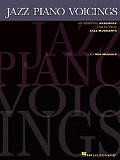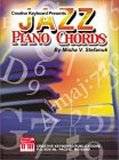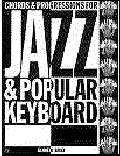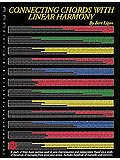These two selections are highly recommended:
 Jazz Piano
Jazz Piano
Voicings
Long-time performer and educator Rob Mullins helps players enter the Jazz world by providing voicings that will help the player develop skills in the Jazz genre and start sounding professional right away - without years of study! Includes a Numeric Voicing Chart, chord indexes in all 12 keys, instrument chord range chart and a beginning approach to playing bass lines.
more info
 Exploring Jazz
Exploring Jazz
Piano Chords
Starting with the most basic intervals, this text explains how chords are built and used in different performance settings. Covering the basics as well as advanced chord types such as 9ths, 11ths, 13ths, drop voicings, substitutions, clusters and polytonal clusters with numerous charts for quick reference, playing with harmonic variety, color and interest.
more info
 Jazz and
Jazz and
Popular Keyboard
The most complete set of chord charts ever published, covering 576 chords in every key. Fully explains the use of modern chord symbols and the use in modern harmony of chords. All left-hand fingerings given. This excellent reference resource also explains and exemplifies the styles of Jazz, Blues and Ragtime chord progressions and patterns.
more info
 Jazz Chords &
Jazz Chords &
Linear Harmony
Connecting Chords with Linear Harmony is written by Bert Ligon. This 150 page study presents three basic outlines used in Jazz performance, improvisation and composition. Appoaches in technique are based on a study of hundreds of detailed examples from great jazz artists including Bill Evans, Miles Davis, George Russell, Gil Evans and more.
more info






